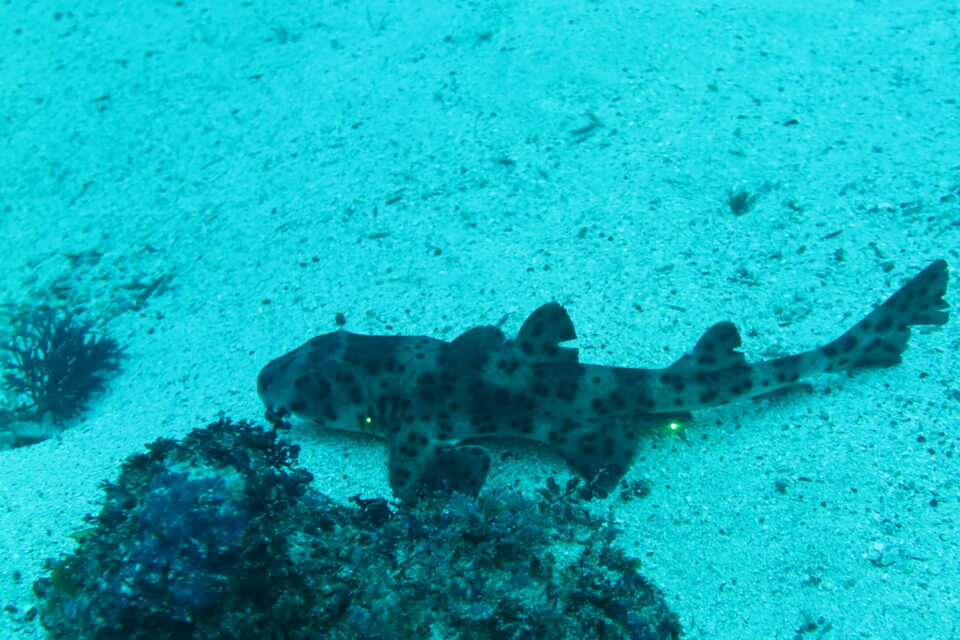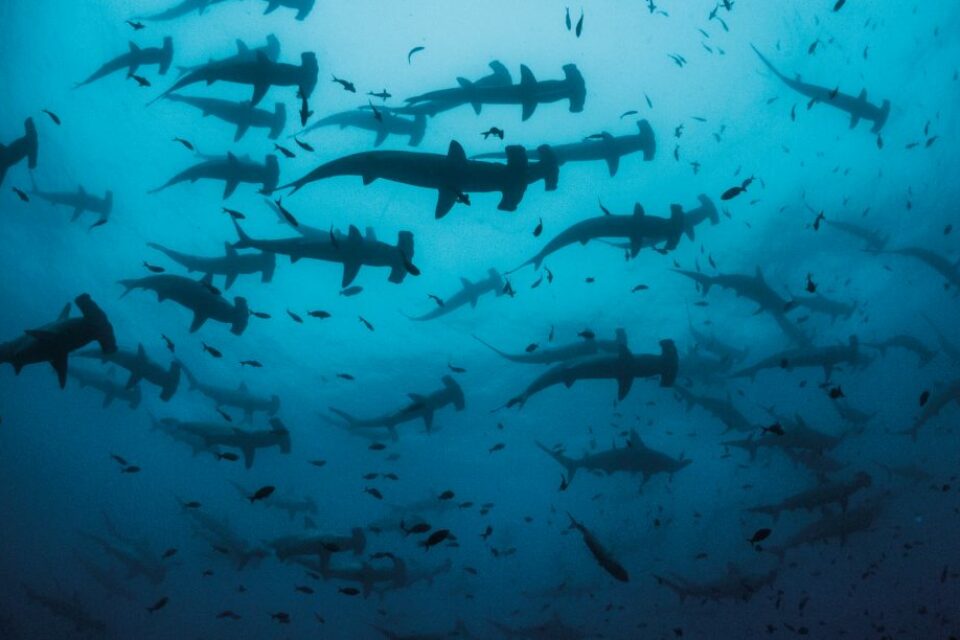

Monaco Ocean Week 2022
We were delighted to be invited to speak at Monaco Ocean Week on 23 March 2022, to discuss the scientific and advocacy efforts behind the new marine protected areas in the Eastern Tropical Pacific, and exploring the innovative tools needed for effective management of pollution and overfishing to build resilience to adverse climate impacts.
Rebalancing the Scales for Ocean Protection in Galapagos and the Eastern Tropical Pacific
For many years, Galapagos Conservation Trust has been working towards increasing the protection of the oceans around the Galapagos Islands to benefit both wildlife and the local population. Following the creation of the new Hermandad Marine Reserve, which added another 60,000km2 of marine protection, we are now supporting partners to measure the impact of, and enforce this, new reserve. Therefore, we were delighted to be invited to speak at Monaco Ocean Week on 23 March 2022, to discuss the scientific and advocacy efforts behind the new marine protected areas in the Eastern Tropical Pacific, and exploring the innovative tools needed for effective management of pollution and overfishing to build resilience to adverse climate impacts.
Keeping the fish in
We believe there are two key components to effectively managing the marine reserves around Galapagos. The first is to ensure that the marine biodiversity remains healthy. The artisanal fishery in Galapagos is second only to tourism in economic importance. Unsustainable approaches to fishing compromise both biodiversity and future livelihoods, meaning working with fishers and managers to improve sustainability is a priority. We also need to ensure better protection for migratory species, particularly sharks, which are integral to a healthy ocean ecosystem. However, shark populations are in rapid decline all around the world, driven partly by the shark fin trade. We are calling for better protection for endangered sharks in Ecuador and internationally.
Keeping pollution out
We have been working towards a plastic pollution free Galapagos since 2017. Plastics have a multitude of impacts on the sensitive ecosystems of Galapagos from the extraction of fossil fuels to large-scale waste management leaks. Our research has shown that action must be taken across the entire plastics supply chain to reduce pollution at a local, national, regional and global scale. As such, we are not only working with local partners to tackle pollution on the Islands, but also with the Pacific Plastics: from Science to Solutions (PPSS) network which is working to reduce plastic pollution through out the Eastern Pacific region.
Monaco Ocean Week presentation
GCT Ambassador Sarah Darwin and GCT Head of Programmes Jen Jones both attended the event in person to give our presentation, joined remotely by some of our key partners. GCT Senior Philanthropy Manager Kelly Hague also attended the event to network with key supporters.
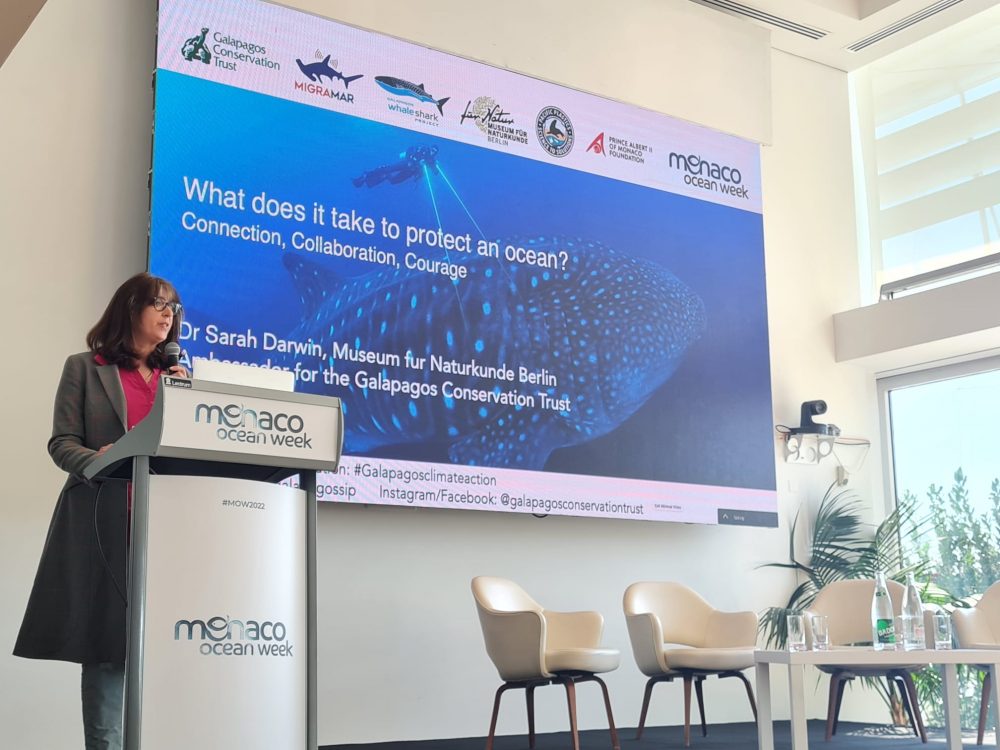
Sarah Darwin presenting at Monaco Ocean Week
Sarah opened the event by celebrating the news of the new Hermandad Marine Reserve, and introduced a short video by HE the Ambassador of Ecuador to the UK, Mr Sebastian Corrál. Jen then introduced GCT’s oceans work and our vision for 2030: that the biodiversity of the Galapagos Marine Reserve will be protected from unsustainable fishing and pollution, increasing climate resilience. As part of her presentation, she included a video showcasing local voices from Galapagos calling for action to protect their Islands.
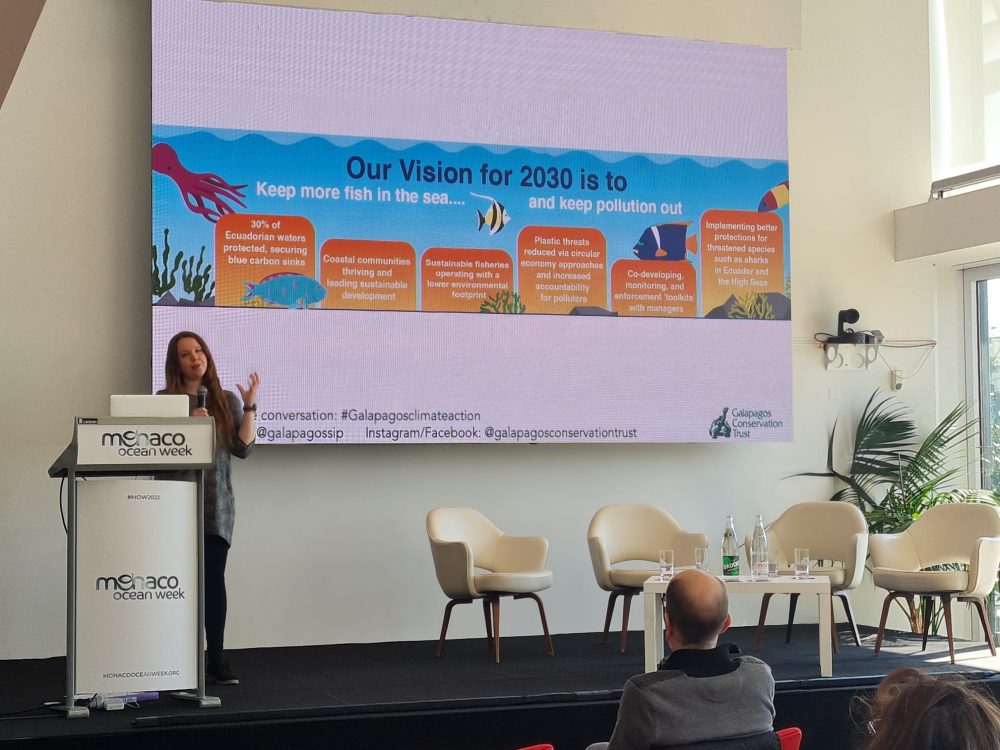
Jen Jones presenting our ocean vision for 2030 at Monaco Ocean Week
A video from Alex Hearn, our partner from USFQ/Migramar, talked about the importance of ocean protection for both sustainable fishing and migratory species.
Then Steffie Ypma, from Utrecht University, and Sol Espinosa, from PPSS, explored how we are working with the PPSS network to develop clean up tools to remove plastic pollution from marine environments, as well as engage a diverse range of people from grassroots organisations to policy makers to ensure future change in the way plastic is used and disposed of in the region.
This work was possible, in part, thanks to generous support from the Prince Albert II of Monaco Foundation.
Jen’s thoughts
There was a clear message throughout Monaco Ocean Week – we must work together to protect more of the global ocean and quickly, in the face of climate change and rocketing biodiversity loss. The ocean is connected despite our human imposed boundaries, and the impacts of overfishing and pollution reach far and wide. Across the events, we saw that action must happen within Marine Protected Areas, Exclusive Economic Zones and on the currently unprotected High Seas. To protect the biodiversity of the Galapagos Marine Reserve (GMR), it is clear that global cooperation is needed – to tackle unsustainable fishing, stop pollution and build climate resilience. We were honoured to raise voices from Galapagos on the stage in Monaco exploring this important topic as well as sharing the results of our shark and plastics work that was generously supported by the Prince Albert II of Monaco Foundation.
There was an undertone of real hope despite the challenges we face. For me personally, I had an extraordinary ‘pinch me’ moment when I had the honour of meeting her royal deepness, Sylvia Earle – a true advocate of hope for the ocean and particularly the GMR and a real inspiration to me personally for her dedication to ocean protection. We also heard an inspiring keynote from Bertrand Piccard (son of Jacques Piccard, the first human to reach the deepest part of the ocean, the Marianas Trench. Bertrand himself was the first to fly around the planet in a solar-powered plane) – whose message that ocean protection should be inspiring, profitable and accessible rather than boring, sacrificial and expensive resonated in a room of ocean optimists. I left inspired by the circular economy opportunities of seaweed, not to mention the value of it as a blue carbon sink. I was encouraged by exciting innovations to fight plastic pollution and excited by the potential of global collaborations that could benefit Galapagos in the long-term as we progress in the UN Decade of the Oceans (2021 – 2030). We have a long way to go to reach our ocean protection vision in the Eastern Tropical Pacific by 2030 and continuing this work is more essential than ever.
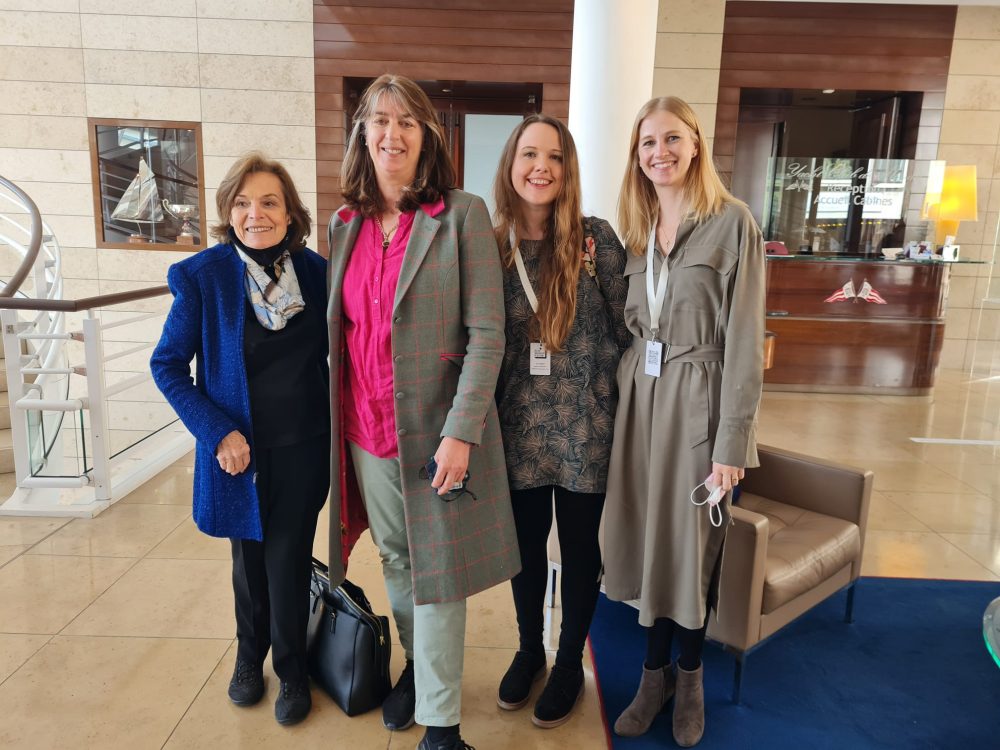
Sarah Darwin, Jen Jones and Lina Hansson met Sylvia Earle at Monaco Ocean Week
Kelly’s thoughts
“We want you to go to Monaco Ocean Week with Sarah and Jen”. I questioned this request. How would GCT and Galapagos benefit from me going, the time out and the cost? Pertinent questions which we always ask ourselves at GCT, but the trouble is, it is not always clear before an event the benefits which might unfold. We had a clear objective – to make sure that the Prince Albert II of Monaco Foundation understood the importance of the funding they have given over the last three years. This funding was crucial in growing our shark and oceans work and gathering vital information on the movements of marine species, which was then used to help gain protection of the new protected area in Galapagos last year.
We are thankful to our core. Our presence at this globally important conference enabled us to talk about our work – more people now know about how our ocean species and plastics work is making breakthroughs. With £100,000 to find in 2022 and more in the coming years to ensure marine protection is enforced, to protect species and fight against some of the big issues of industrial fishing, this is vital. We met a whole variety of people working on practical actions at all levels, as well as potential investors. Was it worth it? Yes!
Sarah’s thoughts
In our journey to halt biodiversity loss, the climate crisis and pollution, we need to consider – connections, collaborations and courage. Monaco Ocean Week was a great example of these three Cs. Scientists, NGOs, financiers, lawyers, engineers, healthcare professionals and innovators were all putting their great minds to solving the problems that are affecting the world’s ocean environments. There were people from all over the world who brought energy, ideas and potential solutions to the table. It was one of the friendliest series of events that I have ever attended with everyone mixing and there was a real buzz of excitement during discussions.
Charles Darwin described the Galapagos Islands as “a little world within itself”. This was on account of the large numbers of unique plants and animals. We now understand more about the interconnectedness of Galapagos with the outside world. It has never been more urgent for broad collaboration from around the world to help us find solutions.
How you can help
Please help us protect our oceans today by giving a donation, adopting a shark, joining up as a GCT member, or signing up to our eNewsletter.
Related articles

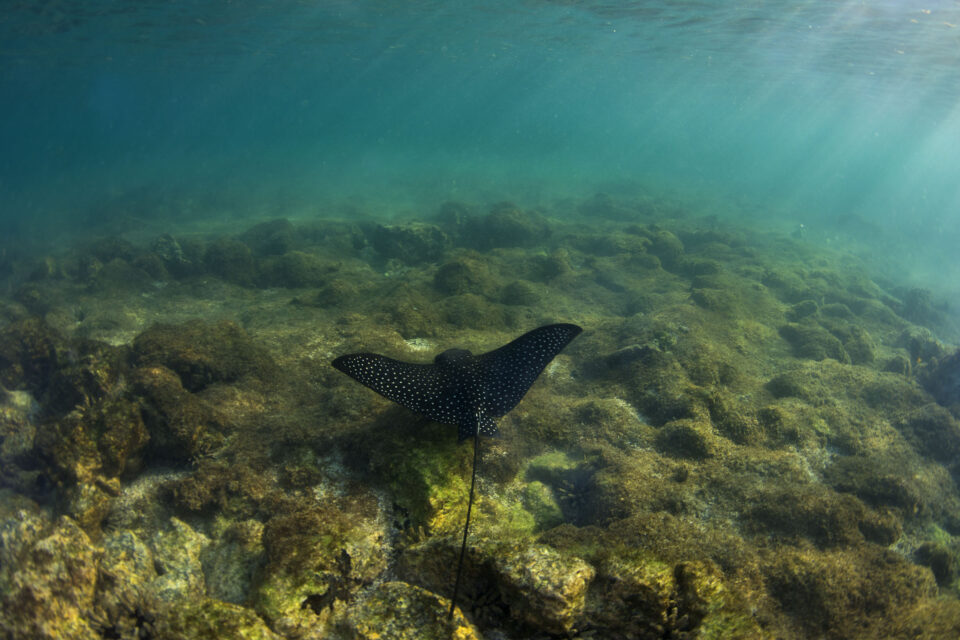
A week in the life of a female marine researcher
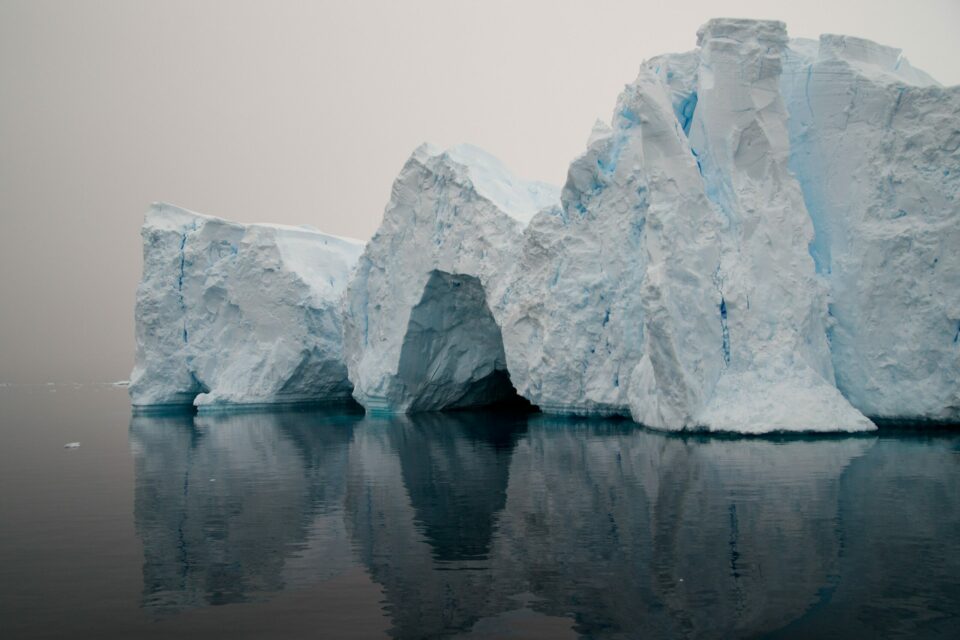
Galapagos and the Antarctic: A look beneath the surface
